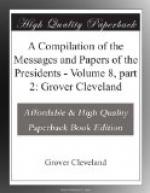The commission, in pursuance of these instructions, having visited the Ponca Indians at their homes in the Indian Territory and in Dakota and made a careful investigation of the subject referred to them, have reported their conclusions and recommendations, and I now submit their report, together with the testimony taken, for the consideration of Congress. A minority report by Mr. Allen is also herewith submitted.
On the 27th of December, 1880, a delegation of Ponca chiefs from the Indian Territory presented to the Executive a declaration of their wishes, in which they stated that it was their desire “to remain on the lands now occupied by the Poncas in the Indian Territory” and “to relinquish all their right and interest in the lands formerly owned and occupied by the Ponca tribe in the State of Nebraska and the Territory of Dakota;” and the declaration sets forth the compensation which they will accept for the lands to be surrendered and for the injuries done to the tribe by their removal to the Indian Territory. This declaration, agreeably to the request of the chiefs making it, is herewith transmitted to Congress.
The public attention has frequently been called to the injustice and wrong which the Ponca tribe of Indians has suffered at the hands of the Government of the United States. This subject was first brought before Congress and the country by the Secretary of the Interior in his annual report for the year 1877, in which he said:
The case of the Poncas seems entitled to especial consideration at the hands of Congress. They have always been friendly to the whites. It is said, and, as far as I have been able to learn, truthfully, that no Ponca ever killed a white man. The orders of the Government have always met with obedient compliance at their hands. Their removal from their old homes on the Missouri River was to them a great hardship. They had been born and raised there. They had houses there in which they lived according to their ideas of comfort. Many of them had engaged in agriculture and possessed cattle and agricultural implements. They were very reluctant to leave all this, but when Congress had resolved upon their removal they finally overcame that reluctance and obeyed. Considering their constant good conduct, their obedient spirit, and the sacrifices they have made, they are certainly entitled to more than ordinary care at the hands of the Government, and I urgently recommend that liberal provision be made to aid them in their new settlement.
In the same volume the report of E.A. Howard, the agent of the Poncas, is published, which contains the following:
* * * * *




